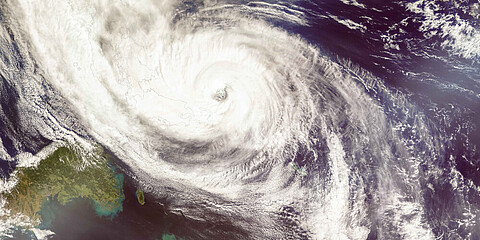
Climate Change Adaptation
Climate change is one of the greatest challenges in the history of mankind. The global consequences of climate change jeopardise the preservation and development of natural and human livelihoods. The poorest countries are particularly affected by the negative impacts of climate change. When it comes to dealing with the impacts of climate change, adaptation plays a key role. Therefore, German development cooperation supports developing countries and emerging economies by adapting to climate change. The German Institute for Development Evaluation (DEval) evaluated the interventions for climate change adaptation in a modular evaluation.
The Modular Evaluation of Interventions for Climate Change Adaptation
Objective
This evaluation aims to provide a synthesis of findings from the modular adaptation evaluation and to answer development evaluation questions relating to:
- The systematic consideration of climate risks (“adaptation mainstreaming”) in German DC;
- The contributions of German DC towards adapting to climate change and strengthening climate resilience;
- The promotion of transformative and conflict-sensitive adaptation interventions.
The purpose of the evaluation is to support the future alignment and impact-oriented further development of the German DC adaptation portfolio. The conclusions and recommendations of the evaluation are aimed at the Federal Ministry for Economic Cooperation and Development (BMZ) and the Funding Programme of the International Climate Initiative (IKI), which the Federal Ministry for Economic Affairs and Climate Action (BMWK) has been implementing since 2022 in close cooperation with the Federal Ministry for the Environment, Nature Conservation, Nuclear Safety and Consumer Protection (BMUV) and the Federal Foreign Office (AA). They are also aimed at the governmental implementing organisations KfW Development Bank (KfW) and Deutsche Gesellschaft für Internationale Zusammenarbeit (GIZ).
Background
German development cooperation aims to strengthen climate resilience by adapting to climate change. The German Federal Government is financially committed to this objective, as well. Between 2011 and 2020, Germany’s climate-related official development assistance (ODA) amounted to USD 45.4 billion, approximately a quarter of all German ODA. Of that amount, over USD 17.5 billion were committed for climate change adaptation interventions.
But to what extent did the Federal Government set relevant priorities for adaptation-related ODA? To what extent do adaptation interventions achieve their objectives? And to what extent does German development cooperation contribute towards strengthening climate resilience in developing and emerging countries? DEval sought to answer these questions in a modular evaluation of climate change adaptation interventions.
Methods
The modular adaptation evaluation comprises a method-integrated design with many different sequential and parallel, cross-case and within-case, qualitative and quantitative methodological components. This method-integrated design serves to increase both the methodological rigor of the evaluation (evaluation quality) and its policy-relevance (usefulness).
Results and Implications
Team
- Dr Martin Noltze Senior Evaluator - Team Leader
- Alexandra Köngeter Evaluator
- Dr Isabel Mank Evaluator
- Kevin Moull Evaluator
- Dr Mascha Rauschenbach Evaluator - Team Leader
- Dr Cornelia Römling Senior-Evaluator - Team Leader
- Dr Gerald Leppert Former Senior Evaluator - Team Leader DEval
- Kai Rompczyk Evaluator
Contact
Dr Martin Noltze
Phone: +49 (0)228 336907-934
E-mail: martin.noltze@DEval.org
Dr Sven Harten
Phone: +49 (0)228 336907-950
E-mail: sven.harten@DEval.org
Policy Briefs
- Climate Change Adaptation: Supporting Partner Countries in Implementing the Paris Agreement
- Climate Policy: Pathways to More Effective Adaptation to the Climate Crisis
- Increasing the Relevance and Effectiveness of Residual Climate Risk Management in German Development Cooperation
- Strengthening Residual Climate Risk Management in German Development Cooperation
- Policy Brief: Climate Change Adaptation: Is German Funding Reaching Particularly Affected Countries?
Discussion Papers
- Does Irrigation Strengthen Climate Resilience? A Geo Spatial Impact Evaluation of Interventions in Mali
- Access to Credit as a Determinant of Autonomous Adaptation to Climate Change. A Meta-analysis of the Evidence in Low- and Middle-income Countries
- Evidence Gap and Intervention Heat Maps of Climate Change Adaptation in Low- and Middle-income Countries
External Publications
- Developing countries can adapt to climate change effectively using nature-based solutions
- Irrigation Strengthens Climate Resilience: Long-term Evidence from Mali Using Satellites and Surveys
- Simulating Changes in Hydrological Extremes—Future Scenarios for Morocco
- Constructing a Credible Estimation for Overreporting of Climate Adaptation Funds in the Creditor Reporting System
- Climate Change Vulnerability Hotspots in Costa Rica: Constructing a Sub‑national Index
- Monitoring, Evaluation and Learning for Climate Risk Management
- Climate Mobility and Development Cooperation
- The Climate Crisis: Four Ways Evaluations Can Strengthen Policymaking
- La crisis climática: cuatro formas de fortalecer el diseño de políticas públicas a través de la evaluación
- Exploring the Link Between Climate Variability and Mortality in Sub-Saharan Africa


